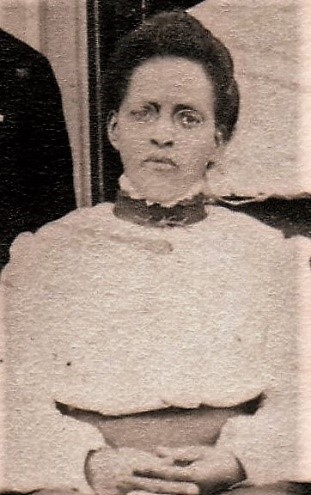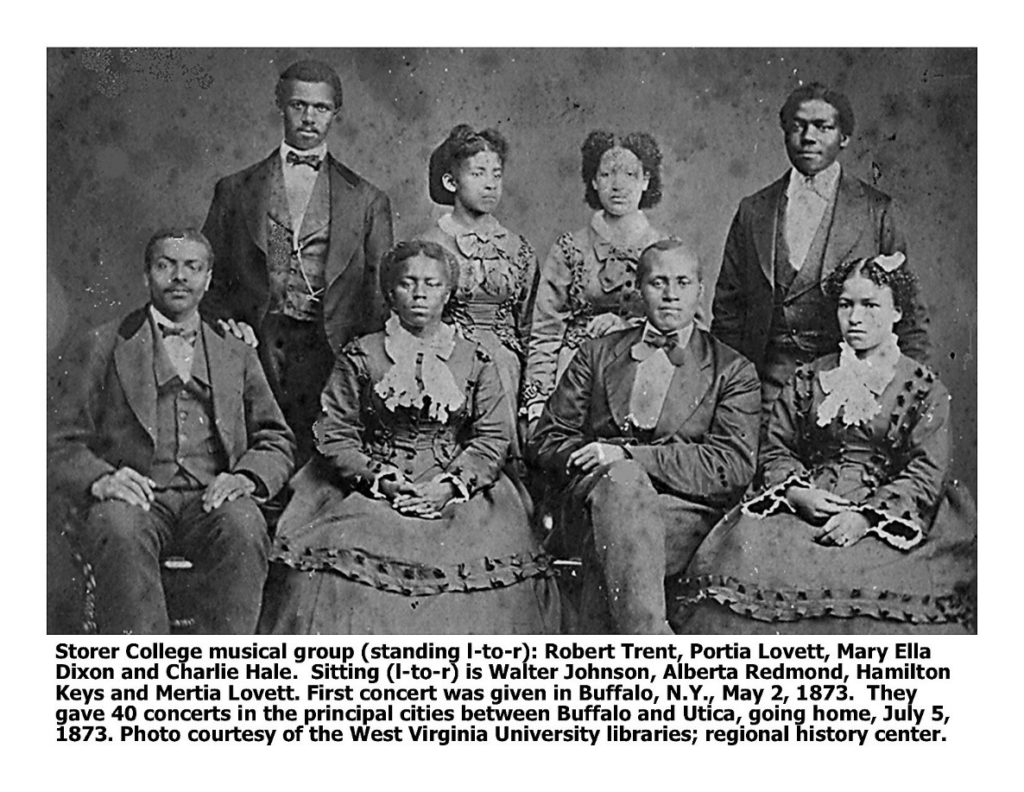
Portia E. Lovett was born Feb. 10, 1859 in Berryville, Va. and grew up on a Clarke County farm in the Shenandoah Valley. Her parents, Wilson and Martha Burns Lovett, sent her to study at Storer Normal School in Harpers Ferry, W.Va., founded to train Blacks to be teachers shortly after the Civil War ended.
She was a 14-year-old soprano in the school chorus when it performed 40 concerts during a mid-1873 tour of upstate New York that included stops in Buffalo, Utica (and Rochester), according to a note accompanying a group picture in West Virginia University’s archives. The 1879-80 edition of Storer’s biennial catalog lists Lovett as an 1874 alumna.1
Lovett taught in Rockingham County, Va. schools 80 miles south of where she grew up.2 After graduation, she also continued to sing with a group that raised money to help pay for a building at her alma mater.
The 1880 U.S. Census listed Lovett as living in the Battletown section of Berryville, Va. with her mother and five younger siblings.
She married fellow educator Benjamin Oliver Bird from Loudon County, Va. on Sept. 29, 1880.2 Together, they blossomed as a team that six years later embraced the challenge of opening a prep school in Princess Anne for Blacks. Initially it was called the Delaware Conference Academy, a branch of Morgan College.
Fellow educator Jacob C. Dunn described Mrs. Bird as “a model wife and mother” of nine children.2
“Her husband received her hearty co-operation in all of his efforts,” Dunn wrote. “As a teacher, she excelled, always making clear the subject at hand.”2
Physiology and elocution were among the subjects Mrs. Bird taught. “She will always be remembered for her work in these departments,” Dunn wrote. “What impressed her pupils most was the sincerity of her character, and the dignity of her womanhood.”2
Mrs. Bird was “widely read,” Dunn noted, and “an ardent student finding great pleasure in keeping her mind ever on the alert for the untried and difficult.”2
When her husband died April 26, 1897, church elders asked Mrs. Bird to assume leadership of the academy, a rare accomplishment for a woman of color in the 19th century. She served in that role until the fall of 1899, when Morgan College’s annual catalogue listed her as a history and literature instructor under Dr. Pezavia O’Connell, the new principal.3
Dunn reported that she died at 4:25 p.m. on Nov. 25, 1899; she was 40 years old. “Her last days … were bright and peaceful.”2
“No one mourns her death in Princess Anne quite as much as the aged and the poor,” Dunn’s tribute reads. “Her well-filled basket was often at the door of someone in need. She was … a Christian woman, refined, polite and loved by all who know her well.”2
Her funeral at Princess Anne’s Metropolitan Methodist Episcopal Church, a short walk up the hill from campus, attracted prominent clergymen of the time, including S.S. Jolly, W.J. Moore and Morgan’s president.
Portia E. Lovett Bird was laid to rest alongside her husband on the campus not far from where she helped transform an unkempt 16-acre farm into an institution of learning.

Footnotes:
1 – 1879-81 Storer College biennial catalog of officers & students; pg. 25
2 – Delaware Annual Conference of the Methodist Episcopal Church, 37th session; pg. 55-56.
3 – 1899-1900 Morgan College annual catalogue; pg. 50.

